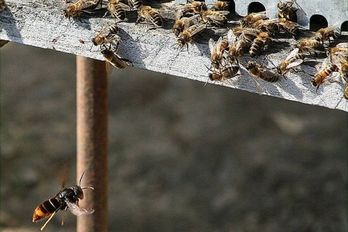Alerts and Reports from the National Bee Unit
The Asian Hornet has Arrived in Gloucestershire
21st September 2016
Oh dear, the dreaded day has arrived. Yellow legs, the Asian hornet has been found near Tetley, Gloucestershire. Two have been found. One dead and one live. It points to there being a nest somewhere nearby. A 3 mile radius is being searched with infrared equipment as per the plan that has been on standby. The arrival has been anticipated for several years as it arrived in France in 2004. Thought to have come to France in pottery from China.
Let's hope we have a really cold winter to kill off hibernating queens.
Let's hope we have a really cold winter to kill off hibernating queens.

Identifying an Asian hornet
- Vespa velutina queens are up to 3cm (1.2in) in length; workers up to 2.5cm (1in)
- Entirely dark brown or black velvety body, bordered with a fine yellow band
- Only one band on the abdomen: fourth abdominal segment almost entirely yellow/orange
- Legs brown with yellow ends
- Head black with an orange-yellow face
National Bee Unit Warning- April 2016
Mite levels
Some of you may not have gotten round to treating your colonies with oxalic acid as the weather was so mild in winter. Treatments that were applied in winter may have had lower than normal efficacy due to the presence of brood and therefore beekeepers may want to consider treating colonies again, especially where bees are showing signs of deformed wings. Thymol based products and formic acid pads may be ineffective at the present time as daytime temperatures respectively of 12-15 °C or above are recommended. Neither should MAQS strips be used on smaller colonies.
Therefore contact strips such as Apistan or Bayvarol may be beneficial, these offer a rapid knock down in severely infested colonies. However, resistance to these products has been reported in some areas and therefore colonies will need to be monitored after the treatment and an alternative treatment applied if necessary later in the season.
Alternatively, Apivar & Biowar (Amitraz) are available under the EU Cascade system by using a special import certificate. For more information about this, contact your local vet.
Animal and Plant Health Agency
North East Report 2015- Ivor Flatman (Regional Bee Inspector)
| ne_report_2015.pdf |